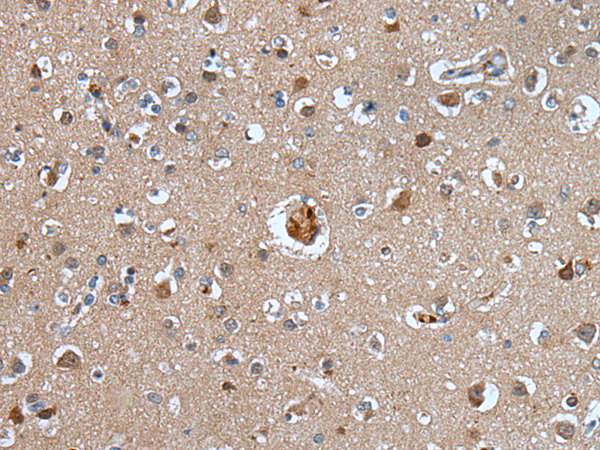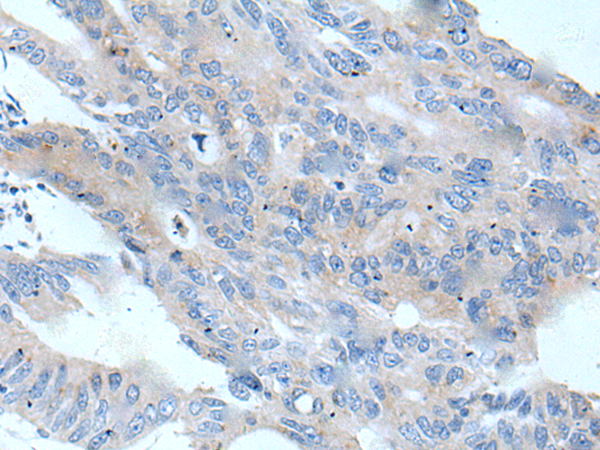

| WB | 咨询技术 | Human,Mouse,Rat |
| IF | 咨询技术 | Human,Mouse,Rat |
| IHC | 1/25-1/100 | Human,Mouse,Rat |
| ICC | 技术咨询 | Human,Mouse,Rat |
| FCM | 咨询技术 | Human,Mouse,Rat |
| Elisa | 1/5000-1/10000 | Human,Mouse,Rat |
| Aliases | PCL; FLT-4; FLT41; LMPH1A; VEGFR3; VEGFR-3 |
| Host/Isotype | Rabbit IgG |
| Antibody Type | Primary antibody |
| Storage | Store at 4°C short term. Aliquot and store at -20°C long term. Avoid freeze/thaw cycles. |
| Species Reactivity | Human |
| Immunogen | Synthetic peptide of human FLT4 |
| Formulation | Purified antibody in PBS with 0.05% sodium azide and 50% glycerol. |
+ +
以下是3-4条关于FLT4(VEGFR-3)抗体的参考文献及简要摘要:
---
1. **文献名称**:*VEGF-C-induced lymphangiogenesis in sentinel lymph nodes promotes tumor metastasis via immune modulation*
**作者**:Kärpänen, T., et al.
**摘要**:研究使用抗FLT4抗体阻断VEGFR-3信号通路,发现其抑制肿瘤转移至前哨淋巴结,并揭示VEGF-C通过调控淋巴管生成和免疫微环境促进转移的机制。
2. **文献名称**:*Therapeutic targeting of VEGFR-3 signaling in lymphatic metastasis*
**作者**:Laakkonen, P., et al.
**摘要**:开发了一种人源化抗FLT4单克隆抗体,在动物模型中显示其通过抑制淋巴管内皮细胞增殖,显著减少乳腺癌淋巴转移,提示其作为抗转移疗法的潜力。
3. **文献名称**:*Blocking VEGFR-3 suppresses angiogenic sprouting and vascular network formation*
**作者**:Tammela, T., et al.
**摘要**:通过抗FLT4抗体阻断VEGFR-3.发现其不仅抑制淋巴管生成,还意外抑制病理性血管生成,表明FLT4在血管重塑中的双重作用。
4. **文献名称**:*Antibody-based targeting of VEGFR-3 for cancer immunotherapy*
**作者**:Sato, Y., et al.
**摘要**:综述了抗FLT4抗体在肿瘤免疫治疗中的应用,包括其与PD-1抑制剂的协同作用,可增强抗肿瘤免疫应答并抑制肿瘤相关淋巴管生成。
---
以上文献涵盖基础机制、抗体开发及临床前应用,均聚焦FLT4抗体在肿瘤转移和血管生成中的功能研究。
The FLT4 antibody targets the Fms-related tyrosine kinase 4 (FLT4), also known as vascular endothelial growth factor receptor 3 (VEGFR-3). FLT4 is a transmembrane receptor tyrosine kinase encoded by the *FLT4* gene, primarily expressed in lymphatic endothelial cells. It plays a critical role in regulating lymphangiogenesis (formation of lymphatic vessels) by binding to its ligands, VEGF-C and VEGF-D, which activate downstream signaling pathways like PI3K/AKT and MAPK, promoting cell proliferation, survival, and migration. Dysregulation of FLT4 is linked to pathologies such as lymphedema, tumor metastasis (via lymphatic spread), and inflammatory diseases.
FLT4 antibodies are essential tools in research and diagnostics. They enable detection of FLT4 expression via techniques like immunohistochemistry, flow cytometry, and Western blotting, aiding in studies of lymphatic system development and disease mechanisms. Monoclonal FLT4 antibodies have also been explored therapeutically to inhibit lymphangiogenesis in cancer, potentially reducing metastatic risk. For example, some antibodies block ligand-receptor interactions or receptor dimerization, suppressing pro-lymphangiogenic signaling. While clinical applications remain investigational, FLT4 antibodies are pivotal in understanding lymphatic biology and developing targeted therapies for conditions involving abnormal lymphatic growth or function. Their specificity and versatility make them valuable in both basic research and translational medicine.
×